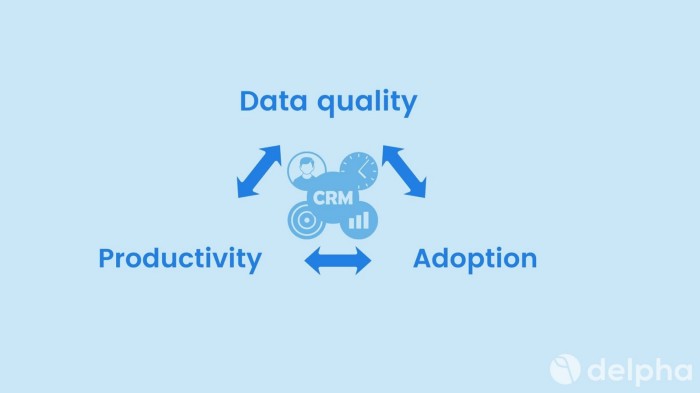Improving Data Quality: A Strategy to Increase Productivity
Published by Bryce Jones on October 3, 2022
To successfully use a CRM, you need to overcome the main challenges connected to the system’s implementation.
To be at the top of your business’ customer relationships management, you are required to have the appropriate strategy and technology in place. SalesForce offers one of the most user-friendly CRM systems. Over 150,000 companies from different sectors use Salesforce in their business operations.

To successfully use any CRM, you will need to overcome the main challenges connected to the system’s implementation. This article will posit how an integration of the AI chatbot can improve the data experience within Salesforce.
According to Chris Hyde, the three main aspects to acknowledge when executing Salesforce are adoption, productivity, and data quality.

Data quality, productivity, and adoption are interconnected and impact each other. Adoption refers to the real use of the system by users. So, if data inputs are outdated or distrustful, the Salesforce usage is less valuable for the reps and vice versa. If users insert invalid or inaccurate data, the adoption becomes hard.
Productivity is the understanding of how sales reps can be more efficient by using Salesforce. In short, how many actions does it take to achieve a task/goal? Salesforce Lightning helps to personalize UI for each user, yet admins do not always understand the whole productivity gain they can get. Gladly, there is AppExchange – the marketplace with useful solutions and extensions for Salesforce adoption and productivity.
While Chris doesn’t allege that one aspect is more important than the others, Delpha will suggest that there is and that’s data quality.
Data is the “blood” of the whole system; ensuring good quality is crucial for making the best data-driven decisions. It undoubtedly impacts both productivity and adoption because it reduces the time spent on mundane data quality tasks and prioritizes actual selling.
A company could arguably possess good quality data yet stumble in productivity and/or adoption due to other factors (management, culture, KPIs, etc.). But we have yet to see an example where adoption and productivity are achieving high levels when data quality is bad.
The lack of trust and wasted resources verifying the truthfulness in bad data holds back the true potential in your team’s productivity and adoption. To learn more about why data quality is so important, check our blog article.

Some internal findings: How can AI solution for data quality help?
Based on my research and conversations with end-users, I have found that the priorities and challenges associated with Salesforce are that usage and personalization differ across regions and organizations.
For example, Coca-Cola’s dashboard about clients’ lifecycle and/or leads will be different from Nike’s. Let’s look at the main challenges within the Data – Productivity – Adoption framework to figure out how improving data quality can augment productivity and adoption of SFDC.
Challenges with Productivity
Average sales reps only spend 34% actually selling – The other 66% of their time is wasted on tasks such as data entry and validation, prospect research, etc.
Sales are bogged down by manual data entry, data cleansing, user mapping – Duplicates, incomplete and inaccurate data prevent sales reps from excelling at their job.
82% of decision-makers believe that sales managers are unprepared for cold calls – The lack of correct and accurate information stops sales reps from making the calls.
18% of sales reps spend their time prioritizing opportunities and account research – Gathering the info about a prospect: their needs, the best communication channels, their pains – might easily take up a couple of hours per day.
Delpha’s solutions for these problems:
- Automates and ensures sales processes
- Augments CRM users to collectively improve data → reducing duplicates, identifying incomplete data and unqualified contacts, preventing error in manual entry
- Guides sales with recommended next best actions and new opportunities as well as flags missed opportunities. You can read more about the recommender system here.
Challenges with adoption
Companies face difficulties when extending their CRM usage to another region or organization. Let’s say Gucci corporate Italy wants to expand SFDC to Gucci corporate America – the American team will have to spend some time to train and adapt each account for the new system they were not familiar with before.
Data migration is a challenging task if not implemented correctly – Managing deduplication, data cleansing, user mapping, and data transferring from previous accounts requires a careful approach.
Only 22% of sales reps reach their sales quota when using non-mobile CRMs – while 65% of them achieve the target if it is mobile friendly. The less access there is to the system, the lower for sales reps the chances of being flexible. Plus, having a complex database on your phone or tablet is not always an achievable task.
Delpha’s solutions for these problems:
- It makes contact transfer more efficient → detects duplicate, incomplete and unqualified accounts
- Empowers users with a version compatible with Salesforce mobile
- Sends personalized recommendations according to specific needs
Challenges with data quality
Bad data causes severe loss of revenue – it costs $15 million for each business on average yearly.
Duplicate data is common when out-boarding or transferring of accounts processes are not clear or enforced – 10% to 30% of data in databases are duplicates.
90% of data in databases are incomplete – it is natural that managers input incorrect phone numbers, email, last name, etc. 33% of bad data comes from human error.
Outdated inputs lead to decreased sales team efficiency – opportunity definition is more problematic when data is unqualified.
Delpha’s solutions for these problems:
- Deduplicates intelligently even the non-exact matches (the process in details here)
- Reduces the number of failed transactions by identifying and fixing incomplete data
- Finds, flags and allows to update unqualified contacts

Delpha offers an AI-powered mobile-friendly solution native to Salesforce. More specifically, the solution helps with inconsistent, duplicate, and unqualified data in your CRM system. By intelligently improving data quality, you are surely augmenting your CRM’s adoption and productivity.
So why not start boosting data quality now?
Want to learn more about Delpha?






